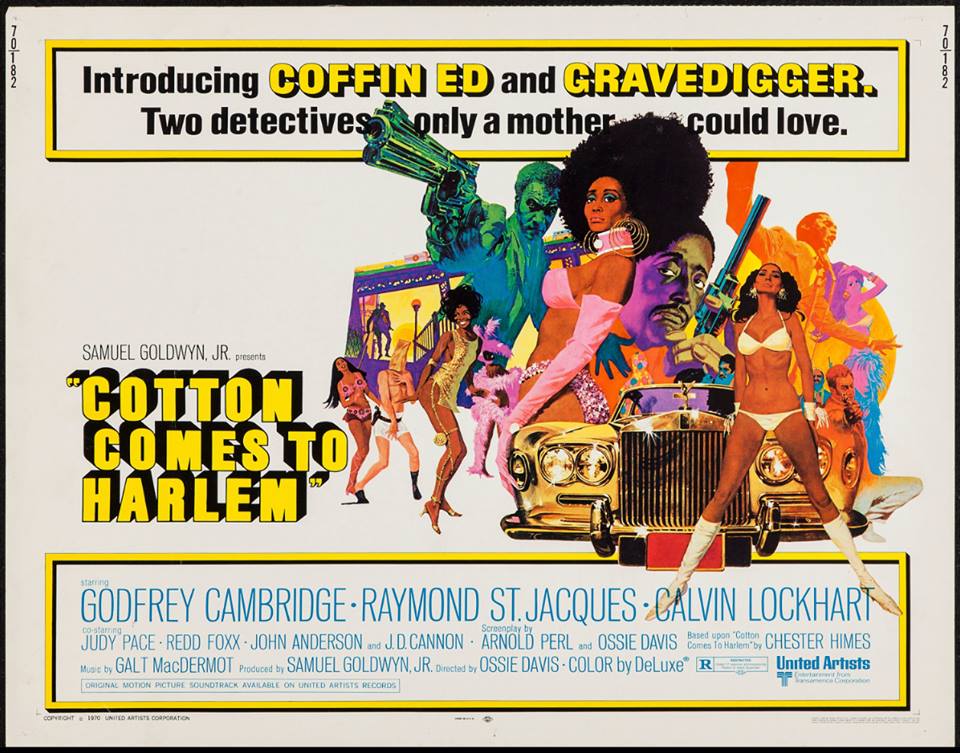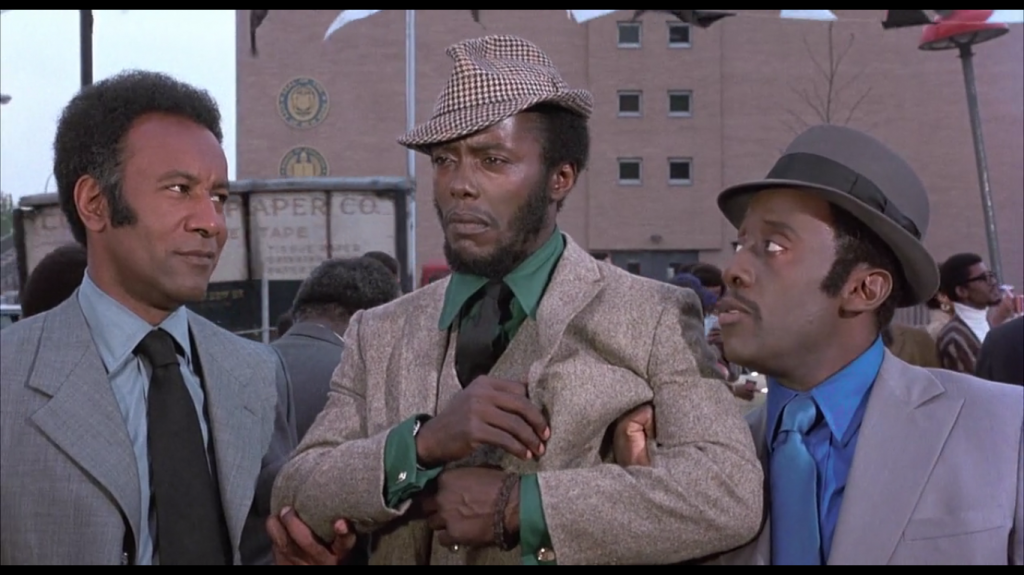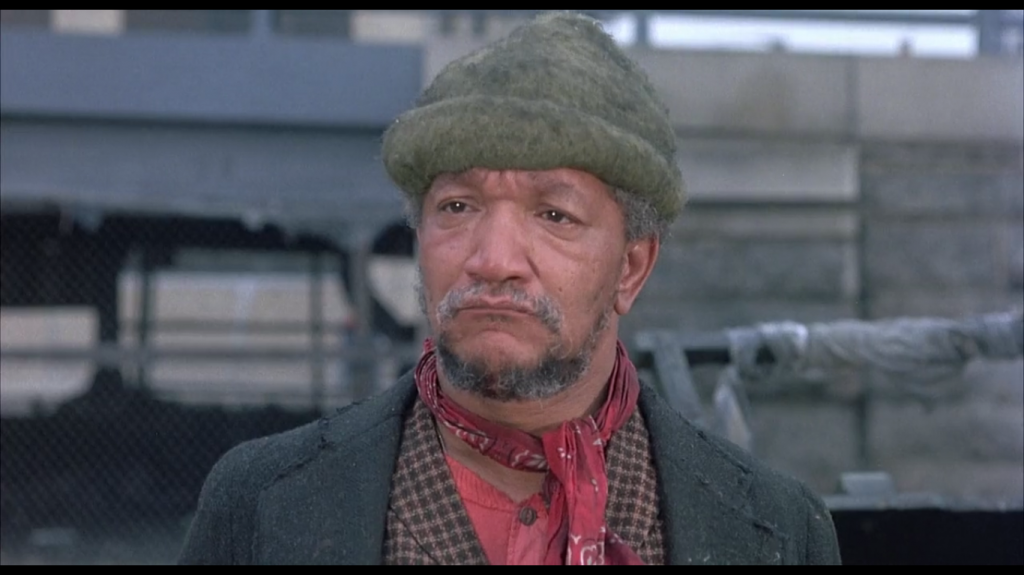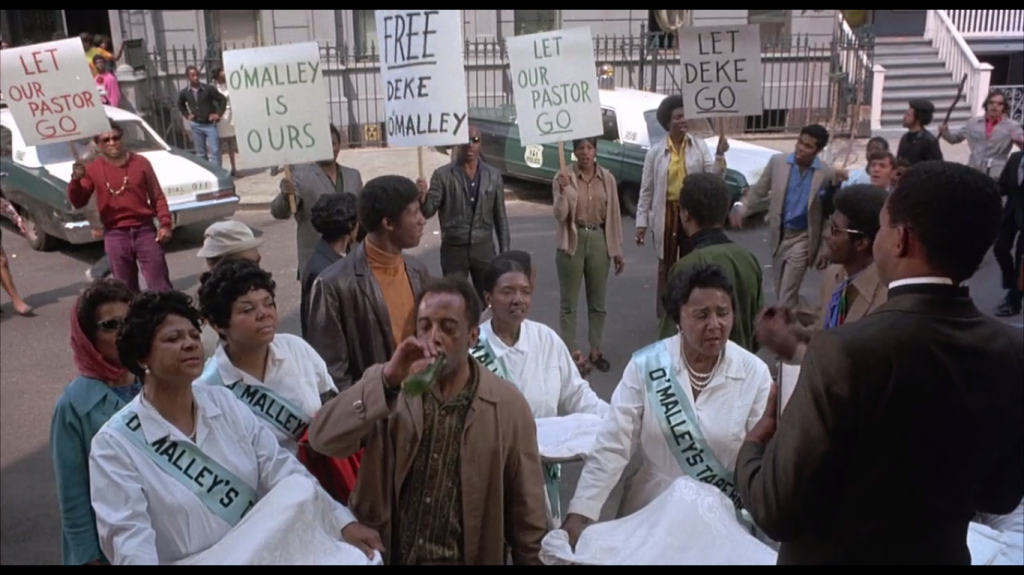Diversity and representation have long been a serious issue in the film industry, and 12 Years A Slave winning some Oscars hasn’t exactly changed that. Outside of that prestigious anomaly, people rarely imagine black film to be much more than gangster movies, cookout comedies, and Tyler Perry. Our very own Dominic Griffin will prove otherwise, shedding a light on unsung, underrated, forgotten and new films that show the breadth and versatility of the black voice in film. Named after one of Billy Dee Williams’ affectionate nicknames, this is Dark Gable Presents…
There’s something about the iconography of blaxploitation that is endlessly palatable. Maybe it’s a combination of having grown up on comic books and being excited by seeing black people beating the shit out of bad guys, but everything about the oft-maligned genre appeals to me. I’ve still never read any of Chester Himes’ work, but I’m big on judging books by their dope ass covers, so watching a screen adaptation of his Cotton Comes To Harlem, co-written and directed by legendary actor Ossie Davis as a pre-blaxploitation film exercise, was a no brainer.
Even being a Himes neophyte, I was loosely aware of his infamous pair of detectives, Gravedigger Jones (Godfrey Cambridge) and “Coffin” Ed Johnson (Raymond St. Jacques), and their tenuous influence on Marvel’s Luke Cage, but that shallow pool of knowledge didn’t much prepare me for the film. Buddy cops, as a rule, are a hard paradigm to fuck up, because the audience for those films are squarely aimed at are already predisposed to wanting to root for brotherhood and weaponized male friendship, but there’s something unique and surprising at the heart of Cotton. Gravedigger and Coffin Ed come off both as legitimate badasses, yes, but they’re also, largely, completely fucking hilarious.
At its core, Cotton Comes To Harlem is one of the progenitors of the kind of sprawling MacGuffin chase crime flick that was so du jour in the nineties, but it functions less like an action thriller and more like a farce. It moves and shakes like an animated comedy, in terms of pacing, shot composition, and structure, but it uses that put upon silliness as a Trojan horse to speak on some real shit. When we meet Coffin Ed and Gravedigger, they’re at a rally for Reverend Deke O’Malley (Calvin Lockhart), a surly con artist masquerading as a man of the people. O’Malley is a duplicitous snake who tricks all of Harlem into believing he’s a martyr, and he raises $87,000 for a (fake) boat ride back to Africa, swindling poor folks out of their hard earned cash on the lie that they’ll get to visit the motherland. The money is stolen during the opening sequence and hidden inside a giant bale of cotton, which becomes the humorously symbolic MacGuffin of the picture. The trail of the cotton paints a treasure map across Harlem, stopping along the way to make some keen observations about urban life, intersectionality, and the various ways people use one another. There’s a lot to love here, honestly. I expected to like the film, but I didn’t anticipate being so impressed with every single aspect of it’s creation. It’s just a sharply executed film that hits all the right spots.
Following a pair of black detectives with an inordinate amount of authority creates a number of interesting relationships within the film, as they find themselves in an odd spot on the crime film hierarchy. White cops have issues with them, but get out of their way because of the results they get, but their own people look down on them because of the establishment they represent. There’s a begrudging amount of respect they garner from all parties involved that’s clearly hard won, but by leaving much of that conflict as subtext and not main plot, the film is able to go in a lot more fascinating directions.
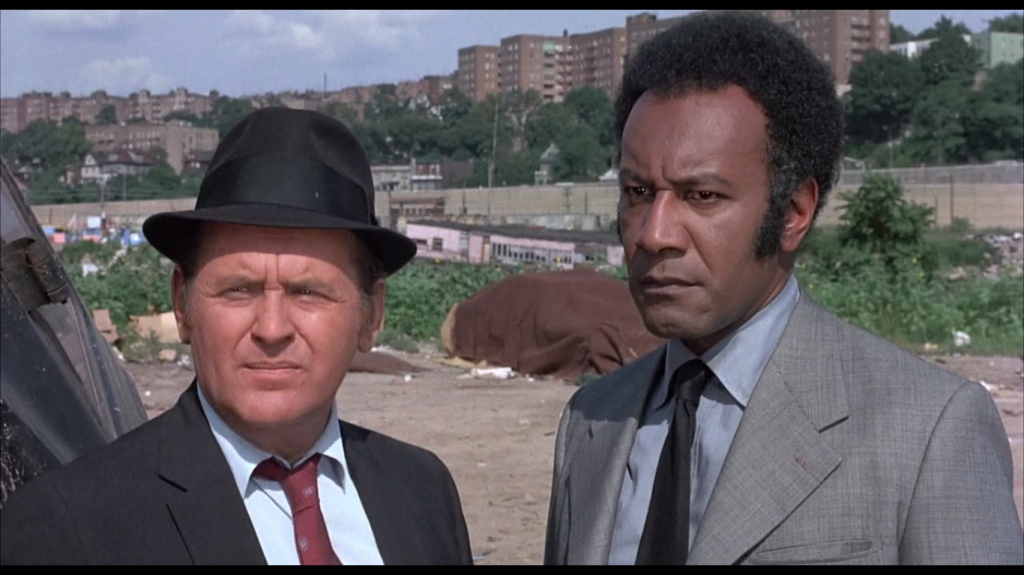
Raymond St. Jacques (right) makes this face through much of the film. It’s one of my favorite cinematic countenances ever.
Much of this rests on the shoulders of our two leads, whose collective chemistry and screen presence are largely responsible for the film’s chameleon-like shifts in tone. Godfrey Cambridge’s Gravedigger Jones is sort of the pre-Crisis version of Bunk from The Wire in terms of pure Black Uncle Swagger. He mixes cynicism and a wry wit in a very peculiar way, coming off world weary and wisened in one scene and humorously above the bullshit in another. Raymond St. Jacques imbues “Coffin” Ed with a fiery temper that seems to only hint at the ferocity from the source material, but he similarly dual wields his emotional instability for laughs or scares with equal aplomb. That he looks like a taller, meaner Bill Cosby and has one notable scene of slapping a woman around is pretty damn discomfiting, a transgression gets mired up somewhere between “knowing, wrongheaded commentary on the abuse of authority prevalent in white cop films” and “very casual misogyny.”
Both performances are made all the more impressive by how little like actual performances they feel. Even though this world has flashes of comic strip-like diversions from realism, the characters presented are lived in and believable in a way that transcends cinema verité.
The supporting players bring a lot of firepower to the film, as well. Judy Pace delivers an incredible turn as Iris, the Reverend’s girlfriend and accomplice. Iris is an outlier in the field of femme fatales, a character whose conniving ways feel more like an evolved survival instinct than the kind of demonizing damnation with which women are often portrayed in crime flicks. There’s a scene in which she escapes a police officer guarding her by tricking him into sex before running out while he’s naked, save for the brown paper bag she demanded he wear over his ugly face. The rhythm of the scene, and the ever changing power dynamics on display, feel prophetic of more modern storytelling techniques, despite being a pretty stereotypical instance of sex as bargaining chip. Redd Foxx has a great part as Uncle Budd, a sweet and lovable side character who becomes inexorably linked to the traveling bale of cotton. He’s not given a lot to work with, but makes memorable magic out of every second of his screen time.
The adversarial relationship between our lead detectives and Reverend O’Malley is so engrossing because of just how unimpeachably sleazy Deke is in every scene. Calvin Lockhart essentially taps into that uniquely despicable middle ground between charm and malice, playing that preternaturally handsome savior that his followers want so badly to believe in, but slowly showing the depths of his own selfishness and greed, negative character traits “Coffin” Ed and Gravedigger see from the very start. It’s telling, given the perniciousness of respectability politics, that the two detectives don’t run into palpable conflict with their white colleagues until they begin to ferociously go after O’Malley, as their superiors just can’t fathom “one of the good blacks” being a front. Both the cops and the citizens would prefer a clearly fabricated beacon of hope like O’Malley to the messier, less idealistic heroes they actually have in “Coffin” Ed and Gravedigger.
This dichotomy is particularly telling in the third act, as O’Malley’s supporters gather around the police precinct where he’s being held, and our heroes have to basically give a somewhat rousing precursor to the speech from the end of The Dark Knight. Ed and Gravedigger may not be perfect, but they give a shit, and they get the job done. They’re the skull-cracking crime fighters Harlem sadly needs, even if a better world would give them the ones they truly deserve.
I’m ashamed to have been so unfamiliar with Ossie Davis as a filmmaker, only having grown up with him as a staple in Spike Lee’s ongoing ensemble. This is an enviable debut for him as a director, juggling a lot of moving parts and unifying them all within a singular vision. Paul Thomas Anderson may have name-checked the Zucker brothers as influences for his latest, Inherent Vice, but Cotton, a similar film thematically, is a much more exciting mixture of hard-edged social commentary and broad, well executed comedy. The gags are set up and delivered with an efficiency and clarity worthy of Tex Avery, but never do they detract or belittle the more relevant concerns of the narrative. It’s like Davis wanted to downplay the darker edge of Himes’ novels and play up the more tongue-in-cheek depictions of an exaggerated Harlem. A lesser filmmaker might take this route as the easy way out to get audiences to watch a black film without the baggage, but Davis gets to have his cake and eat it, too, turning in a populist genre exercise that connected with a burgeoning black filmgoing audience, while still delivering a substantive exploration of black life and the outside factors that dictate its inherent struggles.
It’s a surprise that so many blaxploitation films seemed to piggyback on the loose iconography of Cotton, but few films, from that or any subsequent era, have managed to mimic its sensibilities to craft more black films that hit hard while still aiming to please an audience. It’s obviously a very narrow target to try to hit out of the gate every time, but when it hits the mark, as Cotton so roundly accomplishes, it’s a very special sweet spot.
If you have any films you would like to see covered in this column, hit us up on Twitter @DeadshirtDotNet and we’ll get them in front of Dom.

